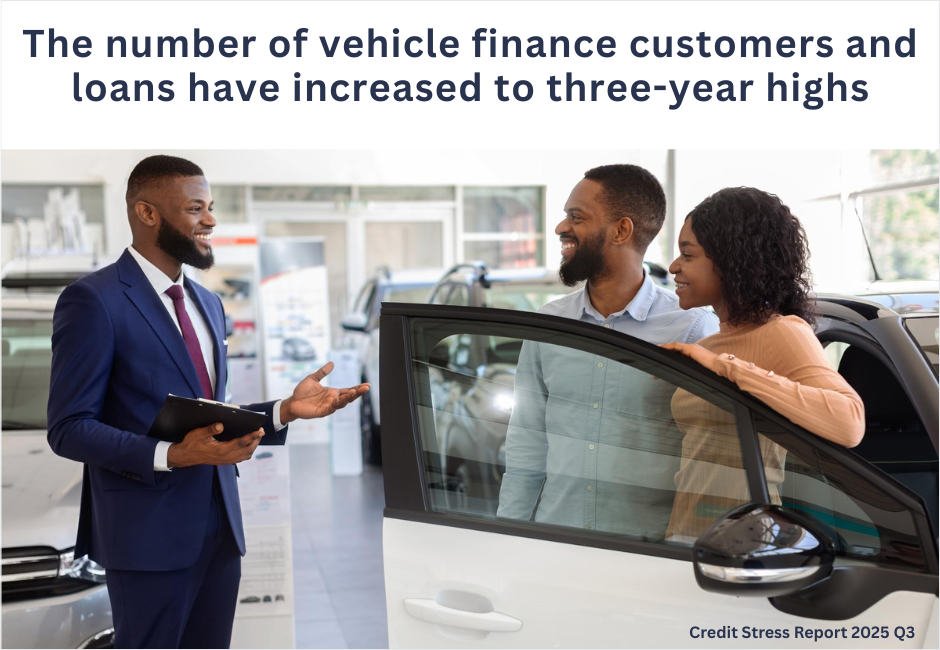Credit Stress Report 2025 Q3 is now available
Economic sentiment remains cautious in the face of mixed indicators: real GDP increased by 0.8% and unemployment fell by nearly 4% quarter-on-quarter, yet GDP forecasts have been revised down to 1% for 2025. There was a further drop in the repo rate while inflation ticked upward.
Consumer credit markets show notable expansion. Both total credit active accounts and total outstanding balances grew significantly year-on-year, with overdue balances continuing to rise by double digits for credit cards and home loans. Vehicle finance showed particular strength: the number of car loans and consumers with vehicle asset finance reached their highest levels in three years.
Download the Credit Stress Report
Every Quarter, Eighty20, in collaboration with Xpert Decision Systems (XDS), releases the Credit Stress Report. The 2025 Q3 Credit Stress Report examines consumer credit behaviour and the key economic events that had an impact on South Africans over the period.
Economic Context
Globally, underlying macroeconomic conditions remained fragile in Q3, with growth decelerating to its slowest pace since the pandemic. Trade tensions, tariff uncertainty, and geopolitical risks, particularly in the Middle East despite truce negotiations, continued to weigh on business and consumer confidence.
Inflationary pressures persisted worldwide. In South Africa, inflation rose whilst the SARB announced the fifth repo rate cut since November 2024. The GDP forecast was revised down to 1% amid mounting economic uncertainty.
Highlights of the Third Quarter
South Africa experienced yet another quarter of mixed economic and credit indicators. Key developments included:
- The rand continued to perform favourably against the USD, strengthening by more than 2% QoQ.
- After declining in Q2, fuel prices reversed course and rose throughout Q3, with consumers only seeing relief when prices eased in early November 2025.
- The FNB/Bureau for Economic Research Consumer Confidence Index fell to -13 in the quarter, down from -10.
Credit Market Dynamics
- The third quarter of 2025 saw continued credit expansion from the previous quarter, noticeably in vehicle asset finance (VAF), reflecting record sales in October for new vehicles. The number of bank and retail loans rose by 7% YoY across all categories except home loans.
- In a notable shift, overdue balances declined by R3 billion (1.4% QoQ) to R212 billion this quarter – the first decrease since Q1 2024. This brought the proportion of overdue debt down to 8.1% of total loan balances.
- This improvement in debt repayment is typical for this time of year, as consumers work to strengthen their credit profiles ahead of peak Q4 spending during Black Friday, the festive season, and summer holidays.
- The total loan balance increased by 0.8% QoQ reaching R2.62trn, representing a R143 billion increase since last year (5.8% YoY). All loan categories except personal loans experienced a YoY growth of at least 6%.
Vehicle Asset Finance
- Vehicle Asset Finance showed remarkable performance. Account volumes marked four consecutive quarters of growth, while outstanding balances surged 6.6% YoY. New VAF business volumes increased by 12% YoY, while both car loan volumes and the number of consumers with VAF reached a three-year high.
- An interesting development is the change in term length since 2024. At the beginning of 2024, roughly 7% of VAF loans had terms of 90 months or more. That proportion has more than doubled to 16% in September of this year.
Looking Forward
South Africa was removed from the FATF grey list in October which will help restore global confidence in our financial system. There has been a subsequent improvement in the exchange rate, a drop in fuel prices and an expected increase in foreign direct investment. Retailers will be hoping that Black Friday and festive season sales mirror the record-setting growth experienced in the automotive sector, which has seen strong performance in both new and used vehicle sales.
Watch this space for analysis of these Q4 trends in our next report.
Download the Credit Stress Report
